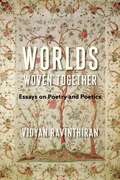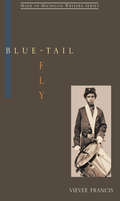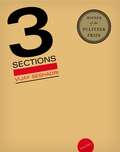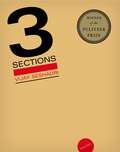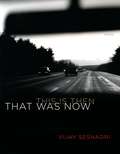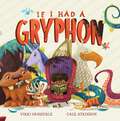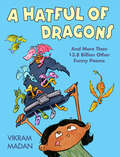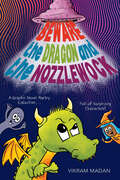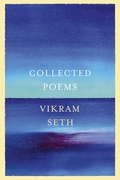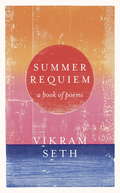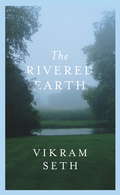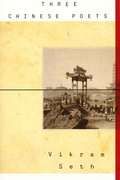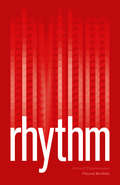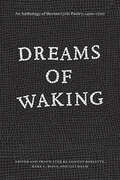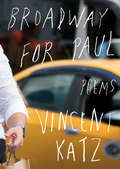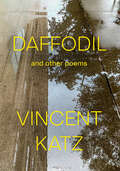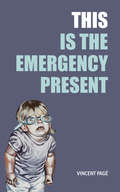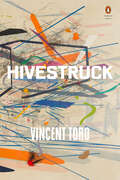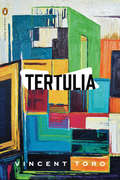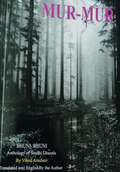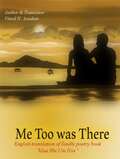- Table View
- List View
Worlds Woven Together: Essays on Poetry and Poetics (Literature Now)
by Vidyan RavinthiranWriting about poetry follows models provided either by academic scholarship or literary journalism, each with its pitfalls. The former distances the reader from the poem and effaces the critic’s personality. In literary journalism, the critic is front and center, but the discussion is introductory and prioritizes value judgments. In either case, entrenched practices and patterns of privilege limit one’s perspective. The situation worsens when it comes to minoritized poets and poets from the Global South, where the focus is on restrictive notions of identity: the stylistic innovations of literary works get ousted by prefabricated historical narratives.In Worlds Woven Together, the critic, poet, and scholar Vidyan Ravinthiran searches for alternatives, pursuing close, imaginative readings of a variety of writers. His essays are open-ended, attentive, and curious, unabashedly passionate and subjective yet keenly analytical and investigative. Discussing neglected authors and those well-known in the West, Ravinthiran sees politics as inseparable from literary form and is fascinated by the relation of the creative consciousness to the violences of history. The book features essays on writers including Mir Taqi Mir, Ana Blandiana, A. K. Ramanujan, Marianne Moore, Eunice de Souza, Czeslaw Milosz, Ted Hughes, Rae Armantrout, Arvind Krishna Mehrotra, Galway Kinnell, Dawn Lundy Martin, and Vahni Capildeo. Revealing serendipitous connections—between poems and cultures, between lines of verse and the lives we lead—Worlds Woven Together is for all readers fascinated by the mechanics and politics of poetry.
Blue-Tail Fly: Blue-tail Fly
by Vievee FrancisA poetic treatment of the period of American history between the beginning of the Mexican War and the end of the Civil War, by Michigan poet Vievee Francis.
3 Sections: Poems
by Vijay SeshadriThe long-awaited third poetry book by Vijay Seshadri, "one of the most respected poets working in America today" (Time Out New York). Vijay Seshadri's new poetry is assured and expert, his line as canny as ever. In an array of poetic forms from the rhyming lyric to the philosophical meditation to the prose essay, 3 Sections confronts perplexing divisions of contemporary life-a wayward history, an indeterminate future, and a present condition of wanting to outthink time. This is an extraordinary book, witty and vivacious, by one of America's best poets.<P><P> Winner of the 2014 Pulitzer Prize in Poetry
3 Sections: Poems
by Vijay Seshadri* Winner of the 2014 Pulitzer Prize in Poetry *The long-awaited third poetry book by Vijay Seshadri, "one of the most respected poets working in America today" (Time Out New York)Vijay Seshadri's new poetry is assured and expert, his line as canny as ever. In an array of poetic forms from the rhyming lyric to the philosophical meditation to the prose essay, 3 Sections confronts perplexing divisions of contemporary life—a wayward history, an indeterminate future, and a present condition of wanting to outthink time. This is an extraordinary book, witty and vivacious, by one of America's best poets.
That Was Now, This Is Then: Poems
by Vijay SeshadriThe brilliant new collection from Vijay Seshadri, author of the Pulitzer Prize–winning 3 SectionsNo one blends ironic intelligence, emotional frankness, radical self-awareness, and complex humor the way Vijay Seshadri does. In this, his fourth collection, he affirms his place as one of America’s greatest living poets. That Was Now, This Is Then takes on the planar paradoxes of time and space, destabilizing highly tuned lyrics and elegies with dizzying turns in poems of unrequitable longing, of longing for longing, of longing to be found, of grief. In these poems, Seshadri’s speaker becomes the subject, the reader becomes the writer, and the multiplying refracted narratives yield an “anguish so pure it almost / feels like joy.”
If I Had a Gryphon
by Vikki VanSickleSam just got a hamster for a pet. But the hamster is kind of boring ... he just eats and sleeps and gets his shavings wet. Inspired by her book of mythological creatures, Sam longs for a more exciting pet. But she soon realizes that taking care of these magical beasts might not be as wonderful as she thought. Sasquatches are messy, unicorns are shy, hippogriffs scare the dogs at the dogpark, and having a fire extinguisher handy at all times makes dragons seem like an awful lot of work. In the end, Sam realizes that her hamster is a pretty sweet and safe pet ... or is he? If I Had a Gryphon is a raucous rhyming read-aloud about fantastical beasts in everyday situations--and the increasingly beleaguered heroine who has to deal with them.
A Hatful of Dragons: And More than 13.8 Billion Other Funny Poems
by Vikram MadanKirkus Reviews Best BookTexas Bluebonnet 2021-2022 Master ListNew York Public Library Best BookDenver Public Library&’s Best and Brightest 2020 Poetry ListALSC Summer Reading SelectionSouth Dakota Prairie Bloom Award FinalistIdeal for fans of Jack Prelutsky and Shel Silverstein, this collection of hilarious poems is perfect for any young reader who likes to read — and laugh!This funny poetry book is full of unusual characters: panda and pangolin musicians, mail-order eggs that hatch dinosaurs (surprise!), ten aliens with a garden-gnome pal, a robot uncle, lots and lots of dragons, and a professor who uses his Page Machine to travel to multiple pages within the book. Vikram Madan's ingenious poems take many forms, from limerick to rebus to a fill-in-the-blank poem that offers more than 13.8 billion funny combinations. All feature clever wordplay, impeccable rhythm and rhyme, and riotous punchlines. This is a quirky collection of poems that readers will laugh their way through again and again.
Beware the Dragon and the Nozzlewock: A Graphic Novel Poetry Collection Full of Surprising Characters!
by Vikram MadanPerfect for fans of Jack Prelutsky and Shel Silverstein, award-winning author Vikram Madan&’s new poetry collection features delicious vocabulary, hilarious poems, and a full-color graphic novel format!Vikram Madan packs this whimsical poetry collection with surprise twist after surprise twist and a host of unusual characters. In these pages, you&’ll meet ghost guppies (and the brave girl who creates them), Stan the Slouching Man™ who&’ll teach you blackbelt slouching, oozing dinosaurs called squishosaurs, a suspicious dragon, and the Nozzlewock (a nose with super-vacuum strength), among many other memorable heroes. Recurring characters and subplots in the art weave the poems together, adding to the merriment. This quirky collection in full-color graphic novel format begs to be read over and over again.
Collected Poems
by Vikram SethWidely celebrated as the author of the worldwide bestselling novels A SUITABLE BOY and AN EQUAL MUSIC, Vikram Seth is also a highly acclaimed poet with a substantial body of work. Here, for the first time in one volume, readers can appreciate the beauty and scope of his poetic vision.
Summer Requiem: From the author of the classic bestseller A SUITABLE BOY
by Vikram Seth'I have so carefully mapped the corners of my mindThat I am forever waking in a lost country...'SUMMER REQUIEM traces the immutable shifting of the seasons, the relentless rhythms of a great world that both 'gifts and harms'. Luminous, resonant and profound, these poems trace the dying days of summer, 'the hour of rust', when memory is haunted by loss and decay. But in the silence that follows, as the soul is cast adrift, there is also reconciliation with the transience of all things; the knowledge that there is a place, 'changeable, that will not betray'.
The Golden Gate
by Vikram Seth"The great California novel been written, in verse (and why not?): The Golden Gate gives great joy."--Gore Vidal One of the most highly regarded novels of 1986, Vikram Seth's story in verse made him a literary household name in both the United States and India. John Brown, a successful yuppie living in 1980s San Francisco meets a romantic interest in Liz, after placing a personal ad in the newspaper. From this interaction, John meets a variety of characters, each with their own values and ideas of "self-actualization." However, Liz begins to fall in love with John's best friend, and John realizes his journey of self-discovery has only just begun. "A splendid achievement, equally convincing in its exhilaration and its sadness."--The New York Times "Seth pulls off his feat with spirit, grace and great energy."--The New Yorker "A marvelous work . . . bold and splendid . . . Locate this book and allow yourself to become caught up, like a kite, in the lifting effects of Seth's sonnets."--Washington Post Book World
The Rivered Earth: From the author of A SUITABLE BOY
by Vikram SethThe Rivered Earth contains four libretti written by Vikram Seth to be set to music by Alec Roth - together with an account of the pleasures and pains of working with a composer.Entitled 'Songs in Time of War', 'Shared Ground', 'The Traveller' and 'Seven Elements', they take us all over the world - from Chinese and Indian poetry to the beauty and quietness of the Salisbury house where the poet George Herbert lived and died.Spanning centuries of creativity and humanity, these poems pulse with life, energy and inspired brilliance.They are accompanied by four pieces of calligraphy by the author.
Three Chinese Poets
by Vikram SethThe three T'ang dynasty poets translated here are among the greatest literary figures of China, or indeed the world. Responding differently to their common times, Wang Wei, Li Bai, and Du Fu crystallize the immense variety of China and the Chinese poetic tradition and, across a distance of twelve hundred years, move the reader as it is rare for even poetry to do.
The Golden Treasury of Indo-Anglian Poetry, 1828-1965
by Vinayak Krishna GokakThis is the comprehensive anthology of English verse written by Indians, compiled and edited by poet and a critic of distinction. Such a volume is of considerable historical value and contemporary interest, for English has been for more than 150 years, and continues to be, a vehicle of creative expression for many of our poets and writers.
Rhythm: Form & Dispossession
by Vincent BarlettaMore than the persistent beat of a song or the structural frame of poetry, rhythm is a deeply imbedded force that drives our world and is also a central component of the condition of human existence. It’s the pulse of the body, a power that orders matter, a strange and natural force that flows through us. Virginia Woolf describes it as a “wave in the mind” that carries us, something we can no more escape than we could stop our hearts from beating. Vincent Barletta explores rhythm through three historical moments, each addressing it as a phenomenon that transcends poetry, aesthetics, and even temporality. He reveals rhythm to be a power that holds us in place, dispossesses us, and shapes the foundations of our world. In these moments, Barletta encounters rhythm as a primordial and physical binding force that establishes order and form in the ancient world, as the anatomy of lived experience in early modern Europe, and as a subject of aesthetic and ethical questioning in the twentieth century. A wide-ranging book covering a period spanning two millennia and texts from over ten languages, Rhythm will expand the conversation around this complex and powerful phenomenon.
Dreams of Waking: An Anthology of Iberian Lyric Poetry, 1400–1700
by Vincent Barletta, Mark L. Bajus, and Cici MalikIn this anthology, Vincent Barletta, Mark L. Bajus, and Cici Malik treat the Iberian lyric in the late Middle Ages and early modernity as a deeply multilingual, transnational genre that needs to break away from the old essentialist ideas about language, geography, and identity in order to be understood properly. More and more, scholars and students are recognizing the limitations of single-language, nationalist, and period-bound canons and are looking for different ways to approach the study of literature. The Iberian Peninsula is an excellent site for this approach, where the history and politics of the region, along with its creative literature, need to be read and studied together with the way the works were composed by poets and eventually consumed by readers. With a generous selection of more than one hundred poems from thirty-three poets, Dreams of Waking is unique in its coverage of the three main languages—Catalan, Portuguese, and Spanish—and lyrical styles employed by peninsular poets. It contains new translations of canonical poems but also translations of many poems that have never before been edited or translated. Brief headnotes provide essential details of the poets’ lives, and a general introduction by the volume editors shows how the poems and languages fruitfully intersect. With helpful annotations to the poetry, as well as a selected bibliography containing the most important editions and translations from all three of the main Iberian languages, this volume will be an indispensable tool for both specialists and students in comparative literature.
Broadway for Paul: Poems
by Vincent KatzFriendship, love, and the potential energy of change animate these poems of walking through New York City.Broadway, the famous artery, both off the grid and definitive of Manhattan as it cuts its way downtown, is a metaphor for Katz's path through these poems: from Lincoln Plaza on the Upper West Side to the African Burial Ground and the courthouses downtown, Katz mines his native city for the deep humanity that undergirds its streets. His title, with its implication that one could give something as large and undefinable as Broadway to a single person, courts an impossibility that generates the possibility of friendship, as well as the largesse Katz wants to find in our civic discourse. In poems such as "Ivanka Skirting" and "This Beautiful Bubble" we encounter his reckoning with a divisive culture that can, he suggests, be healed through our daily acts--through a kind of alert graciousness that also defines his poetry. In this moving collection, we enter Katz's world, both public and private, and experience poetry as a way of seeing that can change hearts and minds.
Daffodil: And Other Poems
by Vincent KatzStopping time on the page to discover the poetic moment where past and present are one, Vincent Katz (called a poet of &“vibrant cinematic hunger&” by Eileen Myles) opens himself to the fleeting beauty of both culture and nature in this stunning gathering of new work.With his painterly eye and disarming concision on the page, Katz opens this book with a powerful image of &“all time sequestered in the fold of a daffodil,&” setting the stage for an encounter with the immediacy we must embrace to see the world around us with clarity. At the center of this collection are his captivating poems about animals—&“The hope in fear / In thrill to run&” of the rabbit, the snapping turtle &“nestled // Next to brother rock&”—as the poems continually engage with the heady passage of days and years, and the promise to honor a life in the here and now, to walk the street with the sense that, &“It&’s not about buying / But rather about feeling the air.&”&“Whether in nature, or on a crowded or empty city street, was all a dream?&” Katz writes, considering Daffodil. &“Surely, there was and is still someone close, and that continues, as animals, despite war, despite incursions, continue. New York is a place of return, where we&’re aware of faces and other things; there, or in a field of flowers, in places in the distant past and present, love has some inexorable way of continuing.&”These poems evoke the exact scenes that command our daily thoughts, that usher in grace and beauty, with their quietly urgent moral qualities, which, Katz suggests, can shape our days if we allow them to.
This Is the Emergency Present
by Vincent PagéPoems about modern romance by a modern romantic <P><P> Moving through a human landscape that exists both in the past and present, the speaker/speakers in This is the Emergency Present attempt to unearth an understanding about love, romanticism, and connection. Using chemistry and physics, the early works of Pablo Neruda, and the abstract broken language around him, Vincent Pagé attempts to define something tangible about presence and absence. By asking "at what point in a transition/ does one thing become the other thing?" he challenges us to consider what it means to be here, and at what point are we finally there?
Hivestruck (Penguin Poets)
by Vincent Toro&“Virtuosic . . . one of our most talented and daring poets . . . Hivestruck crackles with Toro&’s critical vision and dazzling wit.&” —John Keene, National Book Award-winning author of Punks: New and Selected PoemsA poet whose work has focused on Puerto Rican and Latinx history and identity poses the question of what makes us human, and technology&’s part in that process, through a decolonial lensVincent Toro&’s third collection of poetry is a work of Latinxfuturism that confronts the enigmatic and paradoxical relationship human beings have with technology. The poems are a tapestry of meditations on social media and surveillance culture, satires on science fiction and the space race, interrogations of artificial intelligence, cyborg economics, and biohacking, and tributes to women and queer and BIPOC people who have contributed and are contributing to human survival and progress in a technology obsessed world.
Tertulia (Penguin Poets)
by Vincent ToroA fluid, expansive new collection from a poet whose work "dazzles with [an] energetic exploration of the Puerto Rican experience in the new millennium" (NBC News)Puerto Rican poet Vincent Toro's new collection takes the Latin American idea of an artistic social gathering (the "tertulia") and revises it for the Latinx context in the United States. In verses dense with juxtaposition, the collection examines immigration, economics, colonialism and race via the sublime imagery of music, visual art, and history. Toro draws from his own social justice work in various U.S. cities to create a kaleidoscopic vision of the connections between the personal and the political, the local and the global, in a book that both celebrates and questions the complexities of the human condition.
MUR - MUR: English Translation of Sindhi Poetry BHUNI-BHUNI
by Vinod AsudaniThrough this volume, Vinod has started establishing his own different identity in poetry. Not only in ghazal but in every form of literature, the creative artist has to undertake journey, how far he will go depends on what he has contributed to his chosen form.
Me Too Was There: English Translation of sindhi Poetry book “Maa Bhi Ute Hos”
by Vinod AsudaniFrom the author Vinod Asudani comes a fourth anthology of Sindhi Ghazals. Nothing is more valuable reward for the poet than the admiration of readers for his poetry. He would like to express my heartfelt gratitude to all those readers who have appreciated my poetry published in Chingu-Chingu (Sparks-2003), Bahi Jun Padhu (The Roots of Fire-2004) and Bhun-Bhun (Murmur-2012).
Penumbra: English Poems
by Vinod AsudaniThis book contains 57 English poems from the pen of multilingual poet who has already established himself as one of the significant contemporary literary voices in Sindhi and Hindi languages in Indian sub continent. The poems included in this book deal with a wide range of topics. Some of the poems like Biodiversity, In Search of Bahugana and Broken Toys portray sensibility of the disabled. They authentically depict anguish, agony and perspective of a disable person. Many other things such as disillusionment, fragmentary existence, self alienation, Love, romance, social criticism to appear and reappear in different poems. All these things have been approached from different angle and they unfold in the poems in an unusual manner triggering emotional and intellectual response from the readers. Poems included in this volume make readers to reconsider and redefine many of their notions about affection, relationship, myths, social reality, violence, governance and so on.. Poetry is characterised by psychological realism. Many of the poems operate at different levels and each level is made up of many layers. Hence, sometimes, they make heavy demand on intellect and sensibility of readers to fully decipher their connotation.
